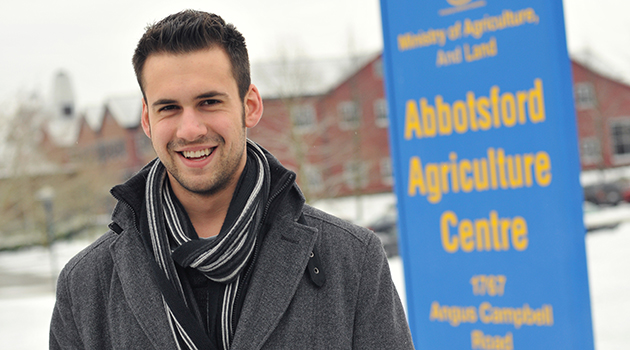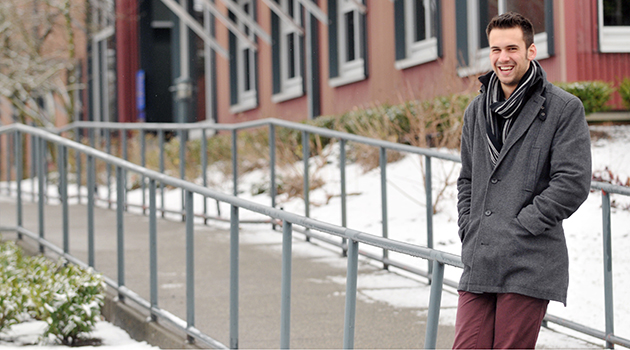UFV biology student making connections and a future through co-op program

Students at UFV ‘make’ many things, from dresses to buildings to gourmet concoctions, in programs such as fashion design, carpentry, and culinary arts. But students who enroll in the co-operative education option, including biology major Brandon Wood, also make money and important career connections.
As his co-op tenure with the BC Ministry of Agriculture in Abbotsford winds up, Wood is already shifting gears for an international student exchange semester in France, taking advantage of another ‘add-on’ option at UFV. Given the connections, contacts, and knowledge gained through his four-month co-op term at the ministry, Wood heavily recommends fellow students take a serious look at the benefits of a co-op experience ahead of the program’s upcoming application deadline of Monday, Jan. 27.
Co-operative Education combines study semesters with full-time, paid employment in a career-related field (work terms). Work terms are four, eight, or 12 months in duration, and are awarded on a competitive basis, just like the ‘real world’ hiring process.
Wood compares co-op work to dating, where neither side is married to the other partner — but a long-term relationship could grow if both agree they’re a good fit.
“The experience has allowed me to showcase my strengths and abilities with no pressure,” he says.
And, he got to make decent money while gaining career-related experience.
“Instead of having a job that pays well but doesn’t benefit you in terms of career specific experience, I was able to achieve both. I was able to take an extended break from classes that benefited me both financially and educationally, so I was able to finish my degree strong with a positive outlook on what I could do with it.”

Wood wasn’t relegated to fetching coffee, either. Working directly under Dr. Siva Sabaratnam, a plant pathologist with the Ministry of Agriculture, Wood combined field and laboratory assignments aimed at identifying and controlling a relatively new disease affecting valuable blueberry plants throughout the Fraser Valley. By collecting and studying samples using knowledge and skills gained in UFV classrooms and co-op placements, Wood hopes to learn why the fungus attacks plants, and how and when to defend against its attack.
“He’s an impressive guy, and very hardworking,” says Sabaratnam.
“Needless to say, we’re fortunate to have UFV as a co-op partner here at the ministry.”
Wood’s co-op experience is typical in many ways, says UFV Science and Technology co-op coordinator Susan Francis.
“Time and time again one of the biggest benefits I see for students in UFV’s co-op program comes down to one word: confidence,” she says.
“Their confidence all around is built working in their first professional placement. They emerge from the program with real-world experience and improvement in a variety of skill sets.”
Students can apply to the Co-operative Education program any time. Applications are reviewed after the application deadlines on the last Monday of the month in September, January, and May.
Co-ops can extend the time it takes to earn a degree from one semester to one year. Students usually try to incorporate some of their co-op placements over the summer months. In order to be considered, applicants need to be full-time students with at least 18 UFV credits while holding a minimum grade point average (2.33 for diploma programs, 2.67 for degrees).
For more information, visit ufv.ca/jobs/co-op-education.






